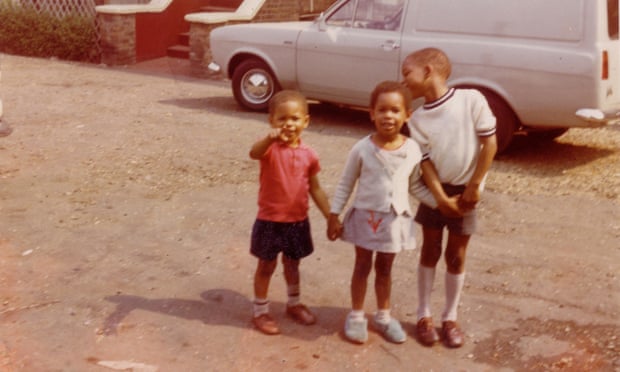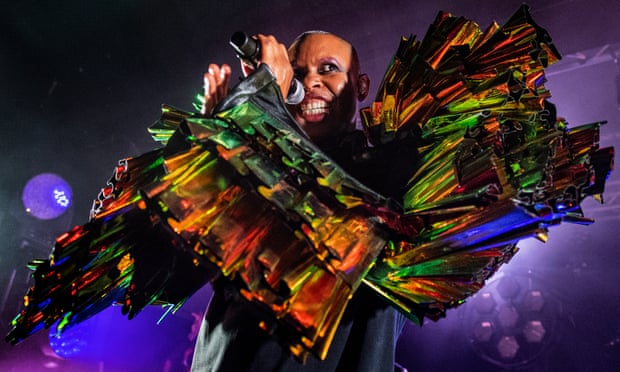Night after night in her early teens, Deborah Anne Dyer – known to all as Skin – woke up to memories of the same recurring dream. She was standing on a stage looking out to a crowd in a state of blissful euphoria, screaming into a microphone at the top of her lungs. These visions may have turned out prophetic, but she couldn’t have known it. Lying in bed, this quiet, unassuming girl from Brixton had no inclination of the rock star she would become.
Since Skunk Anansie formed in 1994, both the band and Skin, their frontwoman, have been unapologetic in their refusal to dilute their substance or style to appease those around them. Their early singles set the tone. First, Little Baby Swastikkka: an anti-fascist anthem. The follow up, Selling Jesus, a scathing review of organised religion and capitalist greed. Together, the band struck a chord: to date they’ve produced six studio albums, and have toured with David Bowie, U2 and Lenny Kravitz. After parting ways in 2001, they reformed in 2009.
Now Skin’s androgynous aesthetic is distinctly high fashion. Back when she first started to wear it, she could have been from another world. And from the outset of her career, she’s been forthright and fearless in being open about her sexuality (she uses “gay”, “queer” and “bisexual” interchangeably). It’s easy to forget just how remarkable and risky a decision that would have been back then.
But for the past few months, Skin feels she’s been treading water; confronted with contrasts and contradictions that have always followed her around. After spending much of the pandemic in a tense New York, surrounded by Black Lives Matter protests, she and her girlfriend recently escaped to the quiet of her secluded, rural Ibiza home.
The new setup might seem Zen: she’s dressed in a black and white striped robe, looking over her swimming pool and out towards the forests which surround it. But her restlessness is apparent, even on a glitchy Zoom call. I ask how she’s found lockdown, and we’re grappling with the existential. “What am I going to change about my life? How will I adapt the way I engage with the public? What do I do creatively?” just some of the questions which come flying back at me.
The music industry, she says, is in the midst of obliteration. She’s terrified that independent, freethinking art will be consumed by the placid pop-loving big corporations that she’s spent a lifetime railing against. “The vultures are circling,” she says, “will everything be owned by O2 and Live Nation?” This angst, it seems, has been compounded by the fact she’s been spending time reflecting, finalising her upcoming biography while being forced to accept that, for now, much of her professional future remains uncertain.
“I’d often get asked to do interviews about Britpop,” she says of her decision to write the book, “and I’m like, you know at the time there was also Björk, trip-hop, electronic music, drum and bass, R&B, reggae and a massive rock industry? It’s almost like everything else that happened was erased by the success of Oasis.” The result, she hopes, will document an alternative 1990s experience. One of a black, queer woman whose story, like so many others, might otherwise have been left untold.
Skin spent her earliest years moving between England’s Royal Air Force bases, before her parents split and her mother took her four kids back to Brixton. Whether at church or in the club her grandfather ran in the basement of his home, she was constantly surrounded by those who’d arrived in Britain as part of the Windrush generation.

At school she struggled to find her place, desperate and yet unable to find the tools for self-expression. Seeing Judi Dench let out a blood- curdling scream during an RSC performance of Macbeth at her school left her tingling, but Skin felt ugly and invisible: “A painfully skinny tomboy with hair that never grew… waiting to be noticed.”
That’s not to say she was oblivious to the depth of emotion and rage inside her. It’s just that after an incident at 11, she’d vowed to never again let it escape. There’d been a girl who’d lived next door: taller and with lighter skin, she’d “acted superior”. One afternoon, the kids were together in Skin’s garden, the girl refused to leave her garden, despite repeated requests. Tensions flared, and the uninvited guest took off her slipper to hit Skin on the forehead. Quite what happened next, she still can’t be sure. Skin blacked out, coming to while kicking this child back over their shared fence.
“It turns out I’d beaten the shit out of her,” Skin says. “She was all black and bruised, but I couldn’t remember anything.” More than 40 years have passed, but the singer, now 53, still sounds a little shaken. “From that moment on I was so scared of losing my temper I became even more insular. I knew I’d never let myself lose control.” It would be years before she’d once again allow herself to channel that anger.
Enrolling at the London College of Furniture marked the start of her transformation into rock goddess and fashion icon. “Within two weeks I completely changed my look,” she says, “and felt free to listen to the music I wanted; to be my own person. But that was the outside. It took a few more years for this shy Christian girl to become more confident.”
That happened while studying at Teesside Polytechnic. Discovering Middlesbrough’s gay scene and political activism at the student union, she finally learned how to be comfortable in her own skin. Then she returned to London, to forge an identity. “Our generation had to work out what it meant to be Black British, which was a whole new thing,” she says. “Not Jamaican girl, not English girl, but kids born in Britain with our own patois and new references.”
It was then that Skin was forced to rediscover that power inside her – the trademark fuel that has propelled and defined her success. After a night out dancing at legendary women-only club night Venus Rising, Skin was violently sexually assaulted by a man on her doorstep. A failed prosecution later, her assailant became a stalker from whom she couldn’t escape. And then one day, after he whispered “I know where you live,” at her on a busy street, something again bubbled up inside her. Skin turned to face the predator and nothing she could do would stop the fury that came flowing out. She shouted and shouted until, publicly shamed, he scuttled away.
“With that guy in the street it was the next time I lost control,” she says, 30 years later. “The way I was in that moment was how I’d always imagined myself performing, and that incident taught me how.” She realised there and then her innate ability to harness strength through her voice, in adulthood no longer at risk of her limbs acting on their own volition. It lifted a lid on part of her character that, from then onwards, would not be repressed.
After that, music came naturally. There was a brief stint in a university covers band before she stepped out at an open-mic Tottenham Court Road nightclub in 1990. Soon Skin was writing songs, and Skunk Anansie formed a few years later. “Ever since then”, she says, “I’ve taken that same energy with me on stage.” It’s strange, she says, how being attacked turned into a moment of liberation. “The part of me who was a young girl attacked on the street has never left me. I learned something in that moment I’ve carried the rest of my life.”
From that day on, she has embraced her discontent and refused to police her emotions. The sexism, racism, homophobia and inequality that felt suffocating became the subject of her live performances and politically charged recorded work. The band’s approach to music is best summed up by the lyrics to the first track on their second studio album: “Yes it’s fucking political; everything’s political.”
Still, there’d be plenty of barriers placed before this band with both a black bassist and lead singer. The explicit racism they’d encounter on international tours was mirrored by the sometimes subtle experiences of prejudice at home.
“Black women from Tina Tuner to Grace Jones and Mel B are perceived as aggressive, overtly sexual, animalistic, panthers in cages,” she says. “The industry then was owned and run by middle-aged white men. If you weren’t sexual they didn’t know what to do with you. You made them feel uncomfortable, because you weren’t playing the game.”
At one photoshoot at the height of Skunk Anansie’s fame, Skin walked into a studio to find a fluorescent light on the floor below where she’d be standing. “They wanted to uplight me and make me look like an ugly black fucking Dracula,” she recalls. “It was like, ‘If we can’t fuck you, then we’re going make you terrifying, a horror story.’” It was a jarring experience: Skin knew she was beautiful regardless of what white industry execs thought. This, Skin feels, is how she has always been perceived and treated. “The world,” she says, “is built on archetypes and stereotypes. And that’s difficult when you don’t fit in.”
Even today, Skin believes she’s seen as threatening and intimidating – an image markedly at odds with the thoughtful, charismatic figure talking to me through her screen. “It’s the singular reason I competed inThe Masked Singer,” she says, of her stint on ITV’s guess-who talent show. “I wanted people to see I had a sense of humour and it worked. People saw I’m not that scary or serious: how could I be when I dressed up as a fucking rubber duck?”
On the page and in person, Skin tells a compelling story: the pioneering British artist for whom the label rock’n’roll royalty should have been well-earned. She celebrated Nelson Mandela’s 80th birthday side by side with Michael Jackson, Nina Simone and Stevie Wonder, and has duetted with Pavarotti for the Dalai Lama. The band have sold more than 5m records, with several albums going multi-platinum. We’ve spent two hours together, Skin gracefully guiding me through her impressive achievements. So I ask if she feels she’s had the recognition she deserves.

“Of course not.” She doesn’t miss a beat. “We are one of the best, most successful live bands to come out of England. We are absolutely not talked about with the same reverence as other bands from our time, that didn’t even touch us in terms of message, presentation or diversity. And also in being plain old fucking successful and selling loads of bloody records.” Granted, she admits, it would serve her no purpose here to be humble. But she’s resolute: her response isn’t arrogance, just a statement of fact.
This, Skin believes, is because of her blackness. The music industry and media couldn’t stomach the idea of an outspoken black woman being a defining figure of the Britpop generation. “We don’t get anywhere near the recognition we deserve,” she says, “because our faces weren’t what the establishment wanted to define Britain.”
What frustrated her most when Stormzy, after his headline Glastonbury set last year, said he was overwhelmed to be the first black British artist to headline the festival wasn’t the grime artist’s mistake (for which he later apologised). “People didn’t realise we’d headlined Glastonbury until we brought it up,” she says, of Skunk Anansie’s 1999 headline set. “It was the normality of it I found most distressing,” says Skin, “so much black history is erased, and Skunk Anansie is part of that black British history.”
“It’s why when that comment was made by Stormzy I wanted to shout: ‘No, no I was here!’ and then [member of Prodigy] Maxim was like: ‘I was there before both of you!’ Suddenly all these black people were fighting to show they did it, because we’d been forgotten, which white artists never have to do. It’s almost like when the establishment writes history, they forget to put our parts, the black parts, in.”
Skin’s smiling now; she knows the tide is turning. “Does all that hurt me though? No,” she sighs, ‘I’m not into that. We were successful, we did it. I’m happy. And do I need to run to the rooftops and shout about it? No. I’m certain one day history will catch up with us again.” When it comes to predicting the future, Skin has form. Today, feels like the UK’s cultural and artistic institutions are on the cusp of a watershed moment: Black Lives Matter, greater LGBTQ+ visibility and the echoes of the MeToo movement forcing a period of introspection and inevitable radical reform. Skin, though, has been preaching this gospel for decades. After a lifetime of being a radical, the rest of us are finally catching up.














